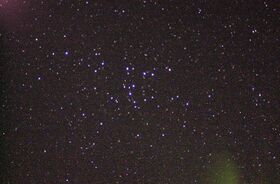Coma Star Cluster
Topic: Astronomy
 From HandWiki - Reading time: 2 min
From HandWiki - Reading time: 2 min
| Coma Star Cluster | |
|---|---|
 The Coma Star Cluster, photographed by astronaut Donald Pettit aboard the ISS in 2003. | |
| Observation data (J2000 epoch) | |
| Constellation | Coma Berenices |
| Right ascension | 12h 22.5m[1] |
| Declination | +25° 51′[1] |
| Distance | 280 ly (86 pc[2][3]) |
| Apparent magnitude (V) | +1.8 |
| Apparent dimensions (V) | 7.5° [2] |
| Physical characteristics | |
| Mass | - M☉ |
| Radius | - |
| Estimated age | - |
| Notable features | Second closest open cluster[citation needed] |
| Other designations | Coma Ber Cluster,[1] Cr 256,[4] Mel 111,[1] OCl 558.0[1] |
The Coma Star Cluster (also known as Melotte 111 or Collinder 256) is a small but nearby open cluster located in the constellation Coma Berenices. The cluster contains about 40 brighter stars (between magnitudes 5 and 10) with a common proper motion. The brighter stars of the cluster make out a distinctive "V" shape as seen when Coma Berenices is rising. The cluster used to represent the tail of Leo. However, in around 240 BC, Ptolemy III renamed it for the Egyptian queen Berenice's legendary sacrifice of her hair.
The Hipparcos satellite and infrared color-magnitude diagram fitting have been used to establish a distance to the cluster's center of approximately 86 parsecs (280 ly).[2][3] The distance established via the independent analyses agree, thereby making the cluster an important rung on the cosmic distance ladder. The open cluster is roughly twice as distant as the Hyades and covers an area of more than 7.5 degrees on the sky.[2][3] The cluster is approximately 450 million years old.

| Identifier | Magnitude |
|---|---|
| γ Com[lower-alpha 1] | 4.81 |
| 12 Com | 4.81 |
| 31 Com | 4.94 |
| 14 Com | 4.95 |
| 16 Com | 4.96 |
| 13 Com | 5.18 |
| 17 Com | 5.24 |
| 21 Com | 5.44 |
| 18 Com[lower-alpha 2] | 5.47 |
| HD 106887 | 5.71 |
| HD 105805 | 5.99 |
| 8 Com | 6.22 |
| 22 Com | 6.24 |
| FM Com | 6.43 |
See also
- Alpha Persei Cluster
- List of nearby stellar associations and moving groups
References
- ↑ 1.0 1.1 1.2 1.3 1.4 "Cl Melotte 111 -- Open (galactic) Cluster". SIMBAD. http://simbad.u-strasbg.fr/simbad/sim-id?Ident=Melotte+111.
- ↑ 2.0 2.1 2.2 2.3 van Leeuwen, F. (April 2009). "Parallaxes and proper motions for 20 open clusters as based on the new Hipparcos catalogue". Astronomy and Astrophysics 497 (1): 209–242. doi:10.1051/0004-6361/200811382. Bibcode: 2009A&A...497..209V.
- ↑ 3.0 3.1 3.2 Majaess, D.; Turner, D.; Lane, D.; Krajci, T. (September 2011). "Deep Infrared ZAMS Fits to Benchmark Open Clusters Hosting Delta Scuti Stars". Journal of the American Association of Variable Star Observers 39 (2): 219. Bibcode: 2011JAVSO..39..219M.
- ↑ Houston, Walter Scott. "Open Clusters by the Season". Sky & Telescope. p. 8. http://www.skyandtelescope.com/observing/objects/deepsky/3304896.html?page=8.[yes|permanent dead link|dead link}}]
- ↑ Tang, Shih-Yun; Chen, W. P.; Chiang, P. S.; Jose, Jessy; Herczeg, Gregory J.; Goldman, Bertrand (2018). "Characterization of Stellar and Substellar Members in the Coma Berenices Star Cluster". The Astrophysical Journal 862 (2): 106. doi:10.3847/1538-4357/aacb7a. Bibcode: 2018ApJ...862..106T.
External links
- WEBDA page for open cluster Coma Ber by Masaryk University
- SEDS – Melotte 111
Coordinates: ![]() 12h 22m 30s, +25° 51′ 00″
12h 22m 30s, +25° 51′ 00″
 |
 KSF
KSF